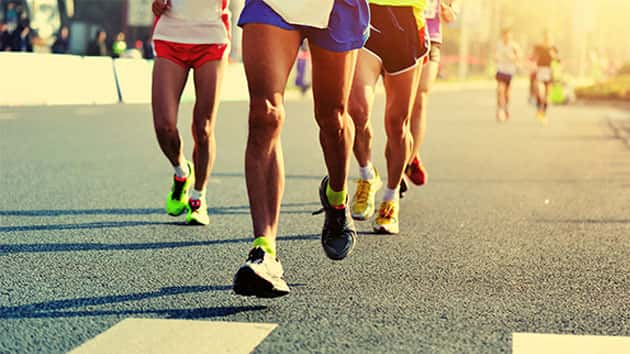 iStock/Thinkstock(NEW YORK) — Among the thousands of runners chasing their dreams Monday at the 2017 Boston Marathon will be two men who are literally running together.
iStock/Thinkstock(NEW YORK) — Among the thousands of runners chasing their dreams Monday at the 2017 Boston Marathon will be two men who are literally running together.
Ivan Castro, 49, a U.S. military veteran who was blinded in both eyes in 2006 during combat operations in Iraq, will be connected by a tether line during the 26.2-mile race to Karl Hinett, 30, a U.K. military veteran who sustained devastating burns across his body from a 2005 attack in Iraq.
The two veterans will take on the same challenge just a few days later when they cross the Atlantic to run the 2017 Virgin Money London Marathon on April 23.
“We both agreed right from the very start that we’d start these races together and we’d finish these races together,” Hinett, who was just 19 when he was injured and has since undergone 50 operations, told ABC News.
Castro described his fellow veteran’s “huge responsibility” in the two marathons, saying, “Karl is going to be my eyes.”
Castro, of Fayetteville, North Carolina, and Hinett, of the Midlands region of the U.K., are running the back-to-back marathons to raise awareness for mental health issues, particularly when it comes to veterans. They are supported in the effort by Heads Together, the mental health initiative founded last year by Britain’s Prince Harry, Prince William and Princess Kate.
“I was approached in May by Prince Harry himself,” said Castro, who was competing at the 2016 Invictus Games when Harry asked him to race Boston and London. “I agreed immediately.”
Hinett first met Harry, a former Apache pilot and founder of the Invictus Games for veterans, in 2012 when Hinett attempted to climb Mt. Everest with a group of wounded veterans. He credits Harry, along with William and Kate, with placing a much-needed spotlight on breaking the taboo around asking for mental health help.
“They have a special place in a lot of people’s hearts,” Hinett said of the royals, adding of veterans William and Harry, “They’ve both served. They both understand what it’s like in the military so they can speak to us on our level, if you will.”
Running to recover
Hinett and Castro both said it was first the idea of running and then being able to actually return to the pavement that helped them recover from the dark days after their life-threatening injuries.
“When I was lying in bed I overheard a nurse and a resident talk about the Marine Corps Marathon so, for me, my first goal was to run a marathon when I was blinded,” said Castro. “That was the first challenge that I took in life and to get to that point, to run a marathon, involves some sort of recovery from the point where I was at.”
He added, “I was really in the pits of my physical and mental state.”
Castro, who recently retired as a U.S. Army major after a 28-year military career, fought back both mentally and physically to remain on active duty and complete more than 50 marathons and two 50-mile ultra-marathons.
He said the “loss of independence,” like having to ask people to run miles with him, does not get easier the further he gets from his injury date, but he now knows he can ask for help.
“Just as I ask for help in that sense of my training and my daily living, the same thing, it requires for people to ask for help when they are going through some trouble or tough times,” Castro said. “Everyone, not only military, but everyone undergoes some certain level of depression or worry or stress which, if not treated, it could ball up to something bigger.”
Hinett found that taking on “the challenge of sport” helped him recover mentally as he watched his body become more able. He has run more than 145 marathon and ultra-marathon races around the globe since sustaining his injuries in 2005.
“It’s a great way of challenging yourself and always showing the message that healthy body is a healthy mind as well,” he said. “It’s much easier to take care of something physical because you can see it but we should be taking care of mental health just as thoroughly as well.”
‘It is OK to go against that stigma’
The photo of Hinett’s tank up in flames after it was hit by a petrol bomb became a lasting image of the Iraq conflict. When asked the biggest obstacle he faced in his recovery, Hinett spoke not of his lasting physical wounds but of his mental health challenges.
“It almost felt like how do I start it? How do I open up with asking for help?” he recalled. “It’s sort of ingrained in you in the military, you get that feeling that you don’t need to because you’re perceived as this invincible fighting force.”
He continued, “As difficult as it felt, all it really did take was [saying] I need help. As simple as that. It is just that easy, just to say, ‘I need help.’”
The two veterans, who have each been logging about 30 miles per week as they train in the U.K. and U.S., hope that both civilians and service members will take that message away from their runs in Boston and London.
“If you’re feeling like you’re having those bad days every single day, it is OK to go against that stigma that surrounds asking for help,” Hinett said. “It starts by having a conversation with someone.”
Funds raised by Castro and Hinett will go to support mental well-being programs run by Home Base, a partnership of the Red Sox Foundation and Massachusetts General Hospital, in the U.S., and Heads Together’s partnerships with mental health-focused charities in the U.K.
Harry, William and Kate will be on hand in London to cheer on the runners. Heads Together is the chosen charity of the 2017 Virgin Money London Marathon and each marathoner will receive a Heads Together headband in their race packet.
Castro and Hinett will also be supported by runners in Fayetteville and Fort Bragg who have committed to running 26.2 miles at the same time Castro and Hinett run in Boston and London.
“We need to make sure that we take care of our men and women who voluntarily serve and protect our freedom,” Castro said. “That is why both Karl and I are doing this, because we care and we love our brothers and sisters and their families.”
Copyright © 2017, ABC Radio. All rights reserved.


